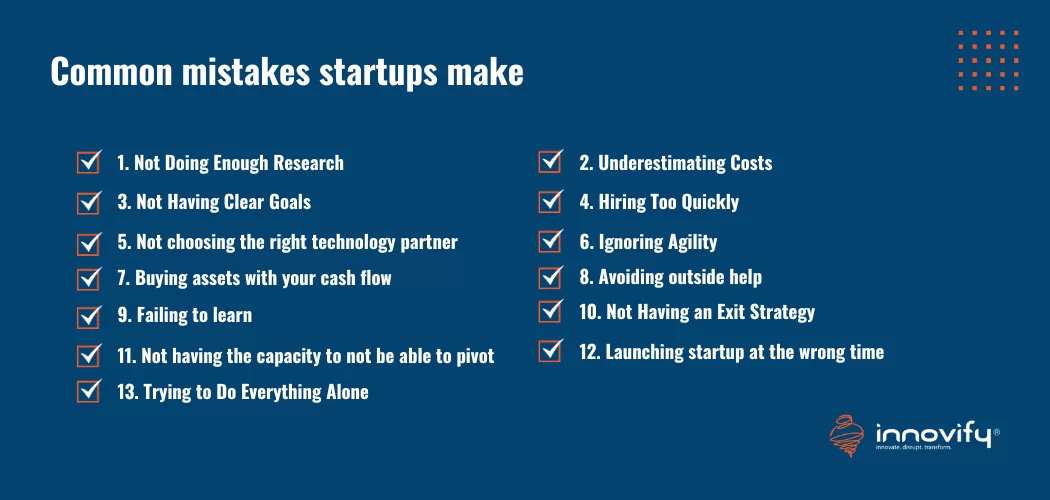AI/ML
13 Common Startup Mistakes to Avoid
Starting a business is an exciting journey, but it comes with its fair share of challenges. You need to consider and execute many things to get your business off the ground. Unfortunately, this can also lead to mistakes that should be avoided with more planning or research. The failure rate of startups is shockingly around 90%, showing that startup mistakes are excruciatingly common.
Every startup has the potential to be successful, but it should still be wary of the startup mistakes made by predecessors. When examining the struggles of failed startups, aspiring business owners can make sure to avoid making similar errors or at least have a plan to quickly course correct if one arises. Invest time and energy into learning as much as possible about startup mistakes, including mistakes related to MVP development so that you take lesser time in moving towards your success journey.
So, let’s understand what are the biggest mistakes made by startup entrepreneurs and how to avoid them. We’ve compiled a list of ten common mistakes that startups make.
13 common mistakes that startups make and how to avoid them

1. Not Doing Enough Research
Before launching a business, you must research the industry and market you plan on entering. Too often, entrepreneurs need to do more research and fail due to unforeseen issues or a lack of understanding about their target audience. It’s essential to take the time to understand the competitive landscape and what potential customers might be looking for in your product or service.
Startups can talk to potential customers, and researching the competition can uncover invaluable insights that allow startup owners to make decisions from an informed standpoint. Doing enough research ensures that startup owners have the necessary information behind them, which can help reduce the likelihood of experiencing costly mistakes down the road.
2. Underestimating Costs
Many new entrepreneurs need to pay more attention to costs associated with running their businesses, such as overhead expenses like rent, supplies, salaries, and more. It’s essential to create a detailed budget before launching your business, accurately estimate all associated costs and ensure you have enough capital for success. You should also factor in unexpected expenses; this way, you won’t be caught off guard if something arises during operations that require additional funds for resolution.
3. Not Having Clear Goals
Any successful business venture needs to establish clear goals so everyone knows what they are working towards from day one. Without clearly defined objectives, team members may be confused about their ultimate goal and not work as efficiently as possible if they don’t understand where they are headed. Set measurable goals with timelines so everyone knows where they stand in progress at any given time throughout operations.
4. Hiring Too Quickly
Hiring employees is an exciting milestone for any new business, but taking your time when making staffing decisions is essential. Many entrepreneurs rush into hiring without adequately vetting potential candidates or offering them a competitive compensation package; this can lead to costly turnover if the wrong hires are made (not to mention wasted time onboarding new employees). Make sure you carefully consider who you hire and how much you pay them; your staff will be integral in helping your business succeed!
5. Not choosing the right technology partner
Choosing a technology partner who does not fit the requirements will devastate the startup. Not only does it cost you valuable resources like time and money, but it can also delay launch timelines and hamper the startup’s overall success.
As a startup business, it’s essential to make sure you choose a technology partner that understands your startup goals and is well-versed in its space. It’s just as vital to understand how the technology partner works so that the startup process runs smoothly and can benefit from their support.
Innovify can be the right technology partner which helps you transform your business with cutting-edge business processes, automation tools, and artificial intelligence solutions. It helps unlock hidden potential for organizations by reducing time spent on mundane tasks and harnessing the power of cloud technology for faster IT migrations. It provides an extensive range of services from applications & data to servers & networking, helping startups focus on what’s important!
6. Ignoring Agility
Ignoring the power of agility can be a common startup mistake. Your startup has fewer resources than its corporate competitors. Your startup should not be approached as if it is trying to win the Super Bowl; instead, account for different scenarios with defined steps leading to potentially varying end goals. Learn from your initial startup mistakes and use them as guidance for future success.
Many successful entrepreneurs failed in their first attempts but improved and thrived after assessing what went wrong. For example, Colonel Harland Sanders – KFC, Donald Trump – the Trump Organisation, and Walt Disney – Disney are entrepreneurs, and businesses didn’t give up. They found the strength within to rise back to success. Each proved that hard work paired with determination leads to remarkable achievements!
7. Buying assets with your cash flow
Another common startup mistake to guard against is purchasing more significant assets with current cash flow instead of using a loan. Utilizing cash on hand for big-ticket items such as equipment and technology may seem like a good idea in the short term; however, this can lead to cash shortage issues further down the road. Seeking out a loan with terms that align with the asset’s expected life is wise financial planning that will pay off in the long run. This approach spreads out payments over time and allows your startup to maintain necessary cash reserves for day-to-day operations.
8. Avoiding outside help
Starting a business can be overwhelming, and startup mistakes are common. That’s why many entrepreneurs find seeking outside help invaluable. Whether finding a mentor, hiring an outside consultant or forming an advisory board, involving people with knowledge and expertise in the industry can provide valuable insight, helping you make informed decisions and avoid startup mistakes. Reaching out to experts can be daunting, but it’s imperative to have multiple points of view if you’re looking to succeed in the startup world.
9. Failing to learn
Failing to learn from startup mistakes is one of the most common pitfalls when starting your own business. It’s natural to want success quickly, but mistakes are part of the process and should be viewed as valuable opportunities for learning. Instead of letting a misstep stop you, recognize it as an opportunity to make changes that will lead to a more successful endeavor in the future. It may not be easy, but many successful entrepreneurs have leveraged failed startup attempts into future successes due to the invaluable lessons they learned along the way.
10. Not Having an Exit Strategy
No matter how successful your startup becomes, you will need an exit strategy at some point—how will you transition out of the company? Will you sell it? Take it public? Let someone else run it? All founders must think through a plan for exiting from day one, so there is no confusion later in the line.
11. Not having the capacity to not be able to pivot
Everyone who is an entrepreneur knows that everything never goes as intended. However, having the ability to pivot is an essential part of the process. There was a time when Nokia owned a paper mill that made rubber boots. Nowadays, it’s a telecom firm.
Odeo was once an online platform for podcasts. However, when Apple introduced its own podcasting platform, Odeo had to pivot. Now, Odeo is a social media site that’s also called Twitter.
In order to be a successful startup proprietor, make sure you have an emergency plan in case of a possible scenario. However, you must be able to adapt and alter your plan if it isn’t successful.
12. Launching startup at the wrong time
The timing of launching a startup is crucial, as it can significantly impact its success. Launching too early may expose the enterprise to risks, such as launching a product or service that lacks market demand or is not fully developed for marketing. It’s important to ensure the startup is adequately prepared before going public, rather than rushing to beat the competition or generate revenue.
On the other hand, waiting too long can also have negative consequences. It may lead to the depletion of resources or a competitor gaining a first-mover advantage with a similar product or service. It’s essential to strike a balance between readiness and procrastination. Setting deadlines and meeting them can help avoid unnecessary delays and ensure that the startup is launched at the right time.
13. Trying to Do Everything Alone
Founders often fall into the trap of taking on too many tasks in their startup, which can lead to inefficiency and reduced results. For example, trying to handle multiple roles such as marketing, development, SEO, customer engagement, and administrative tasks can spread a founder too thin and hinder the growth of the startup.
A solution to this problem is to focus on what you are truly passionate about and excel at. If you are a marketing specialist, prioritize marketing tasks; if you are a developer, focus on coding. Delegate other responsibilities to a team that can support you in areas outside of your expertise.
It’s important to recognize that creating a successful product or service is not a one-person job, and building a capable team is crucial. This may require budgeting for resources, seeking investments, and finding interested individuals who can contribute to implementing your idea.
When choosing team members, it’s not just about their financial interest, but also their fit with you and your team’s vision. If you decide to bring someone on board, be willing to offer them a fair share in your company, acknowledging the value of their time and contribution.
In addition, don’t be afraid to share your ideas with potential team members. Keeping your idea hidden can prevent you from finding the right individuals to share your workload and build a successful startup. Collaboration and delegation are key to effectively managing tasks and responsibilities in a startup environment.
Take Action Now and Avoid Startup Pitfalls
Starting a business is no small feat; many steps are involved in ensuring success along the way. Avoiding common mistakes like a lack of planning and research, failing to secure adequate funding sources, and hiring too quickly can help ensure that your venture takes off without any major hiccups down the line!
Extra care during each process step will set you up for long-term success as an entrepreneur!
If you have an idea, Innovify can help build it for you. We are a specialist Web 3.0 product development studio, providing the best in new product development and digital innovation.
FAQs
Q1: How can startups ensure that they have a clear value proposition?
Startups can ensure that they have a clear value proposition by identifying their target customers, understanding their needs and pain points, and communicating the benefits of their offering in a concise and compelling way. It’s also important to differentiate the value proposition from competitors and validate it with customer feedback.
Q2: How can startups adapt to changing market conditions?
Startups can adapt to changing market conditions by staying up-to-date with industry trends, monitoring customer feedback and behavior, collecting and analyzing data, and being open to pivoting their strategies when necessary. It’s also important to have a flexible mindset, agility, and the willingness to experiment and learn from failures.
Q3: How can startups seek expert advice?
Startups can seek expert advice by networking with experienced entrepreneurs, attending startup events and workshops, seeking mentorship programs, and hiring consultants or advisors with relevant industry expertise. It’s important to choose advisors who have a track record of success, credibility, and a good fit with the startup’s culture and values.




